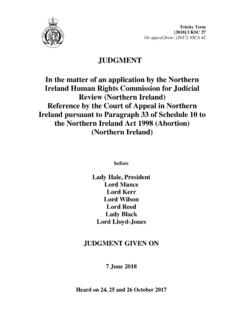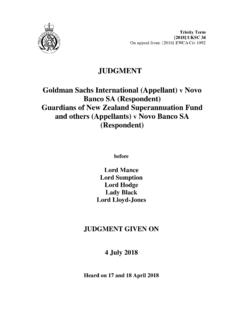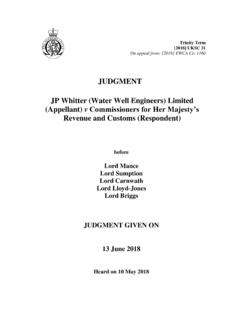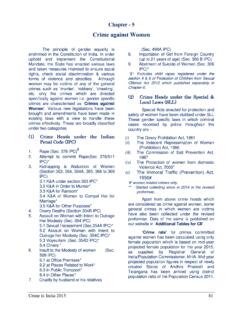Transcription of R (on the application of Nicklinson and another ...
1 25 June 2014 PRESS SUMMARY R (on the application of Nicklinson and another ) (Appellants) v Ministry of Justice (Respondent); R (on the application of AM) (AP) (Respondent) v The Director of Public Prosecutions (Appellant) [2014] UKSC 38 On appeal from [2013] EWCA Civ 961 JUSTICES: Lord Neuberger (President), Lady Hale (Deputy President), Lord Mance, Lord Kerr, Lord Clarke, Lord Wilson, Lord Sumption, Lord Reed and Lord Hughes BACKGROUND TO THE APPEALS These appeals arise from tragic facts and raise difficult and significant issues, namely whether the present state of the law of England and Wales relating to assisting suicide infringes the European Convention on Human Rights ( the Convention ), and whether the code published by the Director of Public Prosecutions ( the DPP )
2 Relating to prosecutions of those who are alleged to have assisted suicide is lawful. Until 1961 suicide was a crime in England and Wales and encouraging or assisting a suicide was therefore also a crime. By section 1 of the suicide Act 1961 , suicide ceased to be a crime. However, section 2 of that Act ( Section 2 ) provided that encouraging or assisting a suicide remained a crime, carrying a maximum sentence of 14 years in prison, but that no prosecutions could be brought without the permission of the DPP. Section 2 was amended by Parliament in 2009, but its basic effect remains unchanged.
3 Following a decision of the House of Lords in 2009, the DPP published Policy for Prosecutors in respect of Cases of Encouraging or Assisting suicide ( the 2010 guidelines ) setting out his policy in relation to prosecutions under Section 2. In the first appeal, Mr Nicklinson suffered a catastrophic stroke some nine years ago, since when he was completely paralysed, save that he could move his head and his eyes. For many years, he had wanted to end his life, but could not do so without assistance, other than by self-starvation, a protracted, painful and distressing exercise.
4 He wanted someone to kill him by injecting him with a lethal drug, but if necessary he was prepared to kill himself by means of a machine invented by a Dr Nitschke which, after being loaded with a lethal drug, could be digitally activated by Mr Nicklinson , using a pass phrase, via an eye blink computer. Mr Nicklinson applied to the High Court for (i) a declaration that it would be lawful for a doctor to kill him or to assist him in terminating his life, or, if that was refused, (ii) a declaration that the current state of the law in that connection was incompatible with his right to a private life under article 8 of the Convention ( Article 8 ).
5 The High Court refused Mr Nicklinson both forms of relief; he then declined all food and died of pneumonia on 22 August 2012. Mr Nicklinson s wife, Jane, was then added as a party to the proceedings and pursued an appeal. Mr Lamb was added as a claimant in the Court of Appeal. Since a car crash in 1991, Mr Lamb has been unable to move anything except his right hand. His condition is irreversible, and he wishes to end his life. He applied for the same relief sought by Mr Nicklinson . The Court of Appeal dismissed the appeal brought by Mr Nicklinson and Mr Lamb.
6 In the second appeal an individual known as Martin suffered a brainstem stroke in August 2008; he is almost completely unable to move and his condition is incurable. Martin wishes to end his life by travelling to Switzerland to make use of the Dignitas service, which, lawfully under Swiss law, enables people who wish to die to do so. Martin began proceedings seeking an order that the DPP should clarify, and modify, his the 2010 Policy to enable responsible people such as carers to know that they could assist Martin in committing suicide through Dignitas, without the risk of being prosecuted.
7 Martin s claim failed in the High Court, but his appeal was partially successful, in that the Court of Appeal held that the 2010 Policy was not sufficiently clear in relation to healthcare professionals. Mrs Nicklinson and Mr Lamb have appealed to the Supreme Court in the first appeal and the DPP has appealed and Martin has cross-appealed in the second appeal. JUDGMENT The Supreme Court, by a majority of seven to two dismisses the appeal brought by Mr Nicklinson and Mr Lamb. It unanimously allows the appeal brought by the DPP, and dismisses the cross-appeal brought by Martin.
8 Each of the nine Justices gives a judgment. On the first appeal, the Supreme Court unanimously holds that the question whether the current law on assisted suicide is incompatible with Article 8 lies within the United Kingdom s margin of appreciation, and is therefore a question for the United Kingdom to decide. Five Justices (Lord Neuberger, Lady Hale, Lord Mance, Lord Kerr and Lord Wilson) hold that the court has the constitutional authority to make a declaration that the general prohibition on assisted suicide in Section 2 is incompatible with Article 8.
9 Of those five, Lord Neuberger, Lord Mance and Lord Wilson decline to grant a declaration of incompatibility in these proceedings, but Lady Hale and Lord Kerr would have done so. Four Justices (Lord Clarke, Lord Sumption, Lord Reed and Lord Hughes) conclude that the question whether the current law on assisting suicide is compatible with Article 8 involves a consideration of issues which Parliament is inherently better qualified than the courts to assess, and that under present circumstances the courts should respect Parliament s assessment.
10 On the second appeal, the Supreme Court unanimously allows the DPP s appeal. The exercise of judgment by the DPP, the variety of relevant factors, and the need to vary the weight to be attached to them according to the circumstances of each individual case are all proper and constitutionally necessary features of the system of prosecution in the public interest. In light of the Supreme Court s conclusion on the second appeal, Martin s cross-appeal does not arise. REASONS FOR THE JUDGMENT The first appeal: is the present law on assisting suicide incompatible with Article 8?












